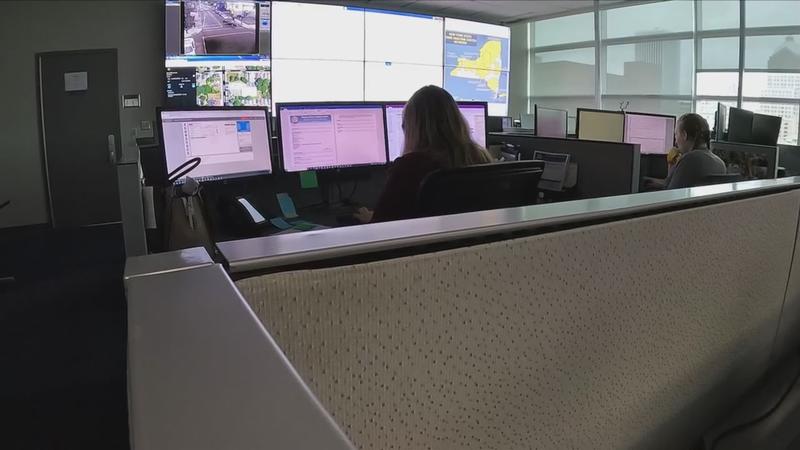News10NBC Investigates: Internet Police ‘It’s just amazing the things we put on social media.’
[anvplayer video=”5108562″ station=”998131″]
ROCHESTER N.Y. (WHEC) — It is incredible what people will post while they’re breaking the law.
That’s one reason why New York State is spending millions of dollars to hire social media analysts to help track illegal guns, arrest suspects and, in some cases, stop conflicts from happening.
And News10NBC got special access to a control room that monitors social media right now and shares what they see with police.
Inside the Monroe Country Crime Analysis Center, analysts search for information seconds after an incident happens, like a shooting, and then share that information with police responding to the scene. But, when asked by investigators, they also search social media accounts of people police are interested in.
Karlee Crist from Holley, NY is one of the analysts.

[News10NBC]
Brean: “Do you recall a case where you can think of—yeah I got this information from social media that helped solve a crime?”
Karlee Crist, analyst, Monroe County Crime Analysis Center: “We pretty much use it in every case. Yeah, pretty much every case has some sort of social media aspect to it.”
David Phelps is the center’s director.
“We had investigators sitting with an analyst reviewing social media when the individual posted live where he was with a gun and they immediately went out and picked up the guy and arrested him with a gun,” Phelps said. “It’s just it’s amazing the things we put on social media.”
Phelps declined to share the specifics of that case—like what the post was and who got arrested—because there are open cases involved in that video. But we have an example.
Three years ago, four teenagers went Facebook live while attacking a man on Mortimer Street in downtown Rochester.
"Someone who was watching Facebook was able to call 911 and let us know what they were watching," former RPD Chief Mark Simmons said in 2019.
The tip and the video got the teenagers arrested. But the analysts who work for David Phelps are looking for other kinds of videos too.
Phelps shared a YouTube video from Detroit and said it’s an example of people, sometimes alleged gang members, posting videos with what appear to be illegal guns.
The budget for the state system of 10 crime analysis centers like the one in Monroe County just doubled including money for more analysts like Crist.
"This way we can find out early on what trends are out there. What are people talking about? What’s the chatter?” Gov. Kathy Hochul said in January.
Brean: “Do you monitor the social media accounts of potential suspects or people you’re interested in?”
Lt. Greg Bello, RPD: “We do check at times if their social media is public and information we can garner off social media.”
Lieutenant Bello is the spokesman for RPD.
“It’s amazing at times how much some of these firearms are posted online of people we know or at times that we’re clued in,” Bello said.
RPD said police do not need permission or a warrant to look at public social media posts.
“I think social media is seen as a trove of information for law enforcement,” said Rachel Levinson-Waldman.
Levinson-Waldman is the deputy director of the Liberty and National Security Program at the Brennan Center for Justice in New York.
For the last four years, Levinson-Waldman and the Brennan Center have been investigating how police use social media for investigations and she says one problem is there are virtually no written rules on what police can and cannot do.
“There are far fewer publicly available policies that really seem to tell both the public how their police departments are going to use social media,” she said. “So not just saying ‘Well social media is useful for investigations,’ or ‘Social media can be used for situational awareness,’ but really robust guidance and limitations around what that would look like.”
RPD’s general order on social media says it can be "useful as an investigative tool." But that is the only mention of social media and investigations.
When I shared that with Lt. Bello he said rules are covered under investigative standards in a different general order.
“We are very cautious about people’s First Amendment rights. We don’t want to go too far,” said David Phelps of the Crime Analysis Center. “And so one of my jobs is auditing what the team does and making sure that we are not crossing the line, that we are only doing things that have criminal investigations attached to them.”
A recent report criticized police in Minneapolis for using covert social media accounts to monitor black protestors and politicians.
I asked RPD if they use covert accounts. Lt. Bello said they don’t get into specifics on what he calls “investigative tools.”
Police use social media to find missing people and quite often they post updates saying they were found.
Police also use social media posts to identify possible fights, especially in schools and then step in to stop the fights before they happen.